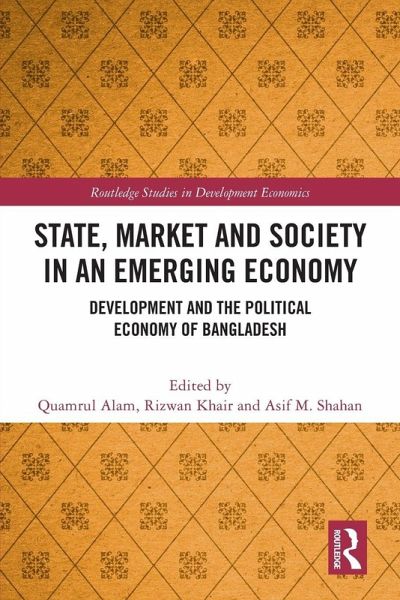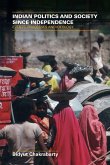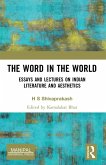State, Market and Society in an Emerging Economy
Development and the Political Economy of Bangladesh
Herausgeber: Alam, Quamrul; Shahan, Asif M; Khair, Rizwan
State, Market and Society in an Emerging Economy
Development and the Political Economy of Bangladesh
Herausgeber: Alam, Quamrul; Shahan, Asif M; Khair, Rizwan
- Broschiertes Buch
- Merkliste
- Auf die Merkliste
- Bewerten Bewerten
- Teilen
- Produkt teilen
- Produkterinnerung
- Produkterinnerung
The economic and social development that Bangladesh has achieved in the last two decades has made Bangladesh a 'Development Paradox". This book explain this paradox through political economy lens.
Andere Kunden interessierten sich auch für
![Gower Handbook of Leadership and Management Development Gower Handbook of Leadership and Management Development]() Richard ThorpeGower Handbook of Leadership and Management Development54,99 €
Richard ThorpeGower Handbook of Leadership and Management Development54,99 €![Indian Politics and Society Since Independence Indian Politics and Society Since Independence]() Bidyut ChakrabartyIndian Politics and Society Since Independence75,99 €
Bidyut ChakrabartyIndian Politics and Society Since Independence75,99 €![Nonformal Education and Civil Society in Japan Nonformal Education and Civil Society in Japan]() Nonformal Education and Civil Society in Japan69,99 €
Nonformal Education and Civil Society in Japan69,99 €![Art History in Africa Art History in Africa]() Jan VansinaArt History in Africa79,99 €
Jan VansinaArt History in Africa79,99 €![The Word in the World The Word in the World]() H S ShivaprakashThe Word in the World61,99 €
H S ShivaprakashThe Word in the World61,99 €![New Labour's State of Health New Labour's State of Health]() Calum PatonNew Labour's State of Health33,99 €
Calum PatonNew Labour's State of Health33,99 €![Celestial Lancets Celestial Lancets]() Gwei-Djen LuCelestial Lancets74,99 €
Gwei-Djen LuCelestial Lancets74,99 €-
-
-
The economic and social development that Bangladesh has achieved in the last two decades has made Bangladesh a 'Development Paradox". This book explain this paradox through political economy lens.
Hinweis: Dieser Artikel kann nur an eine deutsche Lieferadresse ausgeliefert werden.
Hinweis: Dieser Artikel kann nur an eine deutsche Lieferadresse ausgeliefert werden.
Produktdetails
- Produktdetails
- Verlag: Taylor & Francis
- Seitenzahl: 408
- Erscheinungstermin: 19. Dezember 2024
- Englisch
- Abmessung: 234mm x 156mm x 23mm
- Gewicht: 612g
- ISBN-13: 9781032331652
- ISBN-10: 1032331658
- Artikelnr.: 72110303
- Herstellerkennzeichnung
- Libri GmbH
- Europaallee 1
- 36244 Bad Hersfeld
- gpsr@libri.de
- Verlag: Taylor & Francis
- Seitenzahl: 408
- Erscheinungstermin: 19. Dezember 2024
- Englisch
- Abmessung: 234mm x 156mm x 23mm
- Gewicht: 612g
- ISBN-13: 9781032331652
- ISBN-10: 1032331658
- Artikelnr.: 72110303
- Herstellerkennzeichnung
- Libri GmbH
- Europaallee 1
- 36244 Bad Hersfeld
- gpsr@libri.de
Quamrul Alam is Professor of International Business and Strategy at Central Queensland University. Before joining Central Queensland University, Professor Alam worked at Monash University, La Trobe University and Victoria University of Australia. He has a strong research and project management background and has published over 50 journal articles, presented over 100 conference papers and reports, written six books and 21 book chapters, and chaired many sessions in international public management and governance conferences. Professor Alam has supervised 20 PhD research topics including public governance, regulatory governance, public sector leadership, public- private partnership, economic geography and international business, and local government and disaster management. Rizwan Khair is currently working as a faculty member in the South Asian Institute of Policy and Governance of North South University. A former career civil servant, he also served as Member Directing Staff in Bangladesh Public Administration Centre (BPATC) and was Director of the Institute of Governance Studies (IGS), now known as BIGD of BRAC University. His research interests and writings include public policy, public sector management and reforms, governance, human resource management, managing development and GO- NGO relations. His recent publications include co- editor of Managing Change for Better Public Service Delivery (Routledge) and 'Participatory policy process in Bangladesh: Efforts in search of participatory governance?' in Public Service Delivery in Bangladesh: Public Policy and Local Government (UPL, Bangladesh). Asif M. Shahan is currently working as an associate professor at the Department of Development Studies, University of Dhaka. He completed his PhD in Political Science and MPA from George Mason University, USA. His key areas of research are: politics- administration relationships, the emergence, evolution and performance of democratic political institutions, especially the institutions of accountability, performance- based accountability and the politics of policy process.
Introduction 1. State and Class: The Paradox of Development and
Underdevelopment 2. Bangladesh Paradox: The Political Logic of Economic
Development 3. The Development State: The Bangladesh Experience 4. Civil
Society Organizations in Post-colonial Bangladesh: A Coalition with
Business, Civil-military Bureaucracy and Partisan Politics 5. A historical
analysis of the formation of the Bangladesh public administration as an
institutionally complex system 6. Institutions and Economic Development in
Bangladesh: Case Study of the Political Economy of Banks and Financial
Institutions (BFIs) 7. Infrastructure and Development Aspirations of
Bangladesh 8. Industrial Development Policies and Performances in the Post
Independent Period 9. Urban Informal Credit Markets in Bangladesh 10.
Banking Sector in Bangladesh after Financial Liberalization: Promises and
Realities 11. The Global Energy Crisis and South Asia - Challenges for the
Future 12. The social class relationship and agrarian transformation in
Bangladesh 13. Urbanisation, Governance, and Informality 14. Digitalization
of Public Service Delivery: Impacts on Economic and Social Development in
Bangladesh 15. Transformation of Rural Bangladesh: Land, Labor, Credit and
Agriculture 16. Sustainability and Climate Change: The Bangladesh Scenario
17. Opportunities and Impediments of Women Entrepreneurship in Bangladesh
18. SDGs in the Era of the Pandemic: Impacts, Implications, and Improvement
Insights from Bangladesh 19. Impact of Migrant Workers' Remittances on
Rural Bangladesh: A Migrant Smiling Curve Perspective 20. The Way Forward
Underdevelopment 2. Bangladesh Paradox: The Political Logic of Economic
Development 3. The Development State: The Bangladesh Experience 4. Civil
Society Organizations in Post-colonial Bangladesh: A Coalition with
Business, Civil-military Bureaucracy and Partisan Politics 5. A historical
analysis of the formation of the Bangladesh public administration as an
institutionally complex system 6. Institutions and Economic Development in
Bangladesh: Case Study of the Political Economy of Banks and Financial
Institutions (BFIs) 7. Infrastructure and Development Aspirations of
Bangladesh 8. Industrial Development Policies and Performances in the Post
Independent Period 9. Urban Informal Credit Markets in Bangladesh 10.
Banking Sector in Bangladesh after Financial Liberalization: Promises and
Realities 11. The Global Energy Crisis and South Asia - Challenges for the
Future 12. The social class relationship and agrarian transformation in
Bangladesh 13. Urbanisation, Governance, and Informality 14. Digitalization
of Public Service Delivery: Impacts on Economic and Social Development in
Bangladesh 15. Transformation of Rural Bangladesh: Land, Labor, Credit and
Agriculture 16. Sustainability and Climate Change: The Bangladesh Scenario
17. Opportunities and Impediments of Women Entrepreneurship in Bangladesh
18. SDGs in the Era of the Pandemic: Impacts, Implications, and Improvement
Insights from Bangladesh 19. Impact of Migrant Workers' Remittances on
Rural Bangladesh: A Migrant Smiling Curve Perspective 20. The Way Forward
Introduction 1. State and Class: The Paradox of Development and
Underdevelopment 2. Bangladesh Paradox: The Political Logic of Economic
Development 3. The Development State: The Bangladesh Experience 4. Civil
Society Organizations in Post-colonial Bangladesh: A Coalition with
Business, Civil-military Bureaucracy and Partisan Politics 5. A historical
analysis of the formation of the Bangladesh public administration as an
institutionally complex system 6. Institutions and Economic Development in
Bangladesh: Case Study of the Political Economy of Banks and Financial
Institutions (BFIs) 7. Infrastructure and Development Aspirations of
Bangladesh 8. Industrial Development Policies and Performances in the Post
Independent Period 9. Urban Informal Credit Markets in Bangladesh 10.
Banking Sector in Bangladesh after Financial Liberalization: Promises and
Realities 11. The Global Energy Crisis and South Asia - Challenges for the
Future 12. The social class relationship and agrarian transformation in
Bangladesh 13. Urbanisation, Governance, and Informality 14. Digitalization
of Public Service Delivery: Impacts on Economic and Social Development in
Bangladesh 15. Transformation of Rural Bangladesh: Land, Labor, Credit and
Agriculture 16. Sustainability and Climate Change: The Bangladesh Scenario
17. Opportunities and Impediments of Women Entrepreneurship in Bangladesh
18. SDGs in the Era of the Pandemic: Impacts, Implications, and Improvement
Insights from Bangladesh 19. Impact of Migrant Workers' Remittances on
Rural Bangladesh: A Migrant Smiling Curve Perspective 20. The Way Forward
Underdevelopment 2. Bangladesh Paradox: The Political Logic of Economic
Development 3. The Development State: The Bangladesh Experience 4. Civil
Society Organizations in Post-colonial Bangladesh: A Coalition with
Business, Civil-military Bureaucracy and Partisan Politics 5. A historical
analysis of the formation of the Bangladesh public administration as an
institutionally complex system 6. Institutions and Economic Development in
Bangladesh: Case Study of the Political Economy of Banks and Financial
Institutions (BFIs) 7. Infrastructure and Development Aspirations of
Bangladesh 8. Industrial Development Policies and Performances in the Post
Independent Period 9. Urban Informal Credit Markets in Bangladesh 10.
Banking Sector in Bangladesh after Financial Liberalization: Promises and
Realities 11. The Global Energy Crisis and South Asia - Challenges for the
Future 12. The social class relationship and agrarian transformation in
Bangladesh 13. Urbanisation, Governance, and Informality 14. Digitalization
of Public Service Delivery: Impacts on Economic and Social Development in
Bangladesh 15. Transformation of Rural Bangladesh: Land, Labor, Credit and
Agriculture 16. Sustainability and Climate Change: The Bangladesh Scenario
17. Opportunities and Impediments of Women Entrepreneurship in Bangladesh
18. SDGs in the Era of the Pandemic: Impacts, Implications, and Improvement
Insights from Bangladesh 19. Impact of Migrant Workers' Remittances on
Rural Bangladesh: A Migrant Smiling Curve Perspective 20. The Way Forward








